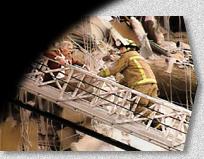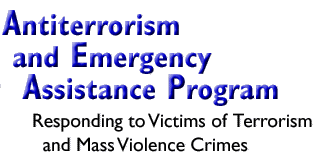


  |
 |
The Office for Victims of Crime (OVC) is committed to promoting justice and healing for all victims of crime. As an agency of the U.S. Department of Justice, OVC administers federal funds to support victim services, provides training for diverse professionals who work with victims, develops projects to enhance victims’ rights and services, and undertakes public education and advocacy activities on behalf of crime victims. OVC works with international, national, tribal, state, military, and local victim assistance and criminal justice agencies and other professional organizations to promote fundamental rights and comprehensive services for crime victims. Crimes of Terrorism and Mass Violence The threat of terrorism and criminal mass violence against Americans, both in the United States and abroad, has increased in recent years. Such acts leave victims with serious physical and emotional wounds and challenge government officials and communities to respond immediately with appropriate effort. Victim assistance and compensation providers face the daunting task of coordinating effective and timely responses, providing information and assistance to victims, and working closely with other agencies and victim service organizations. OVC can help. Through the Antiterrorism and Emergency Assistance Program, we are committed to providing assistance to communities reeling from terrorist attacks and other cases of mass violence. Available Assistance OVC offers five categories of assistance to respond to terrorism and mass violence: crisis response, consequence management, criminal justice support, crime victim compensation, and training and technical assistance. Assistance in each category targets a specific phase in the aftermath of a crisis and is designed to meet the immediate and extended needs of victims and the community.
Allowable Activities
In addition, a limited amount of available funding, as agreed upon by OVC and the applicant, may be used for administrative purposes deemed necessary and essential to the delivery of services and assistance to victims. Eligible Applicants Eligible applicants for funds include state victim assistance and victim compensation programs; U.S. Attorneys; Offices; victim service and nongovernmental organizations; and federal, state, and local governments. (Note: Funding is not available to foreign governments.) If multiple requests for funding are received from a single jurisdiction, applicants must describe plans for collaboration. In addition, funded activities should be coordinated with agencies such as state emergency preparedness agencies, state mental health agencies, local chapters of the American Red Cross and the United Way, and federal and state law enforcement and prosecution personnel. Antiterrorism and Emergency Assistance Programs funds may be used to provide services and assistance to—
The Antiterrorism and Emergency Assistance Program guidelines (appearing in the Federal Register, Vol. 67, No. 21, under Victims of Crime) and the application process now are available online. Reviewing the materials now will best prepare you to take immediate action if a crisis occurs. OVC stands ready to help you deliver timely assistance to victims of terrorism and mass violence crimes. For more information about the Antiterrorism and Emergency Assistance Program or to obtain information about precrisis planning, please contact Program Manager, Terrorism and International Victims Unit, Office for Victims of Crime, 810 Seventh Street NW., Washington, DC 20531 (phone 202–307–5983).
Photo at top courtesy of Oklahoma City KWTV 9. Building photo courtesy of Federal Emergency Management Agency. |